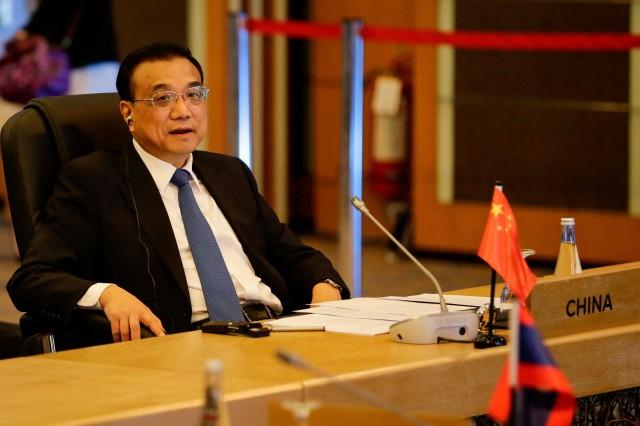South China Sea code of conduct talks to be 'stabilizer' for region — China premier

China's agreement to begin talks with the Association of Southeast Asian Nations (ASEAN) on the fine print of a code of conduct framework for the disputed South China Sea will help to stabilize the region, Chinese Premier Li Keqiang said.
"China's greatest hope is for peace and stability in the South China Sea," Li told ASEAN leaders in Manila.
The Chinese and Southeast Asian foreign ministers in August adopted a negotiating framework for a code of conduct in the South China Sea, a move they hailed as progress but seen by critics as a tactic to buy China time to consolidate its maritime power.
While the South China Sea was not as dominant an issue at this summit at a time of relative calm, there was an underlying acknowledgement among ASEAN members that the risk of a miscalculation in the disputed waterway could flare up at anytime.
Li, addressing ASEAN leaders during a summit in the Philippines capital Manila on Monday, said there was a consensus on moving forward and to try to peacefully resolve the issue.
"We hope the talks on the code of conduct will bolster mutual understanding and trust," Li said, according to a transcript of his speech released by China's Foreign Ministry on Tuesday.
He added that he hoped this would be a "stabilizer" for the region, while pledging that China would "firmly safeguard" the freedom of navigation and overflight in the strategic waterway where $3 trillion worth of goods passes every year.
Critics, however, say the agreement to talk on the details of the code of conduct is only an incremental move, with a possible final agreement still years away.
While Li did not give a timeframe, Philippines' President Rodrigo Duterte, who was chairing the regional summit, said China was being pressed to set a specific date and that Beijing responded it would "consider really fast-tracking" the code of conduct.
"China has graciously agreed to a code of conduct and it binds itself to the agreement," Duterte said.
The framework seeks to advance a 2002 Declaration of Conduct (DOC) of Parties in the South China Sea, which has mostly been ignored by claimant states, particularly China, which has built seven man-made islands in disputed waters, three of which are equipped with runways, surface-to-air missiles and radars.
All parties say the framework is only an outline for how the code will be established but critics say the failure to outline as an initial objective the need to make the code legally binding and enforceable, or have a dispute resolution mechanism, raises doubts about how effective the pact will be.
Signing China up to a legally binding and enforceable code for the waterway has long been a goal for claimant members of ASEAN, some of which have sparred for years over what they see as China's disregard for their sovereign rights and its blocking of fishermen and energy exploration efforts.
Malaysia, Taiwan, Brunei, Vietnam and the Philippines all claim some or all of the South China Sea and its myriad shoals, reefs and islands. China claims most of the waterway and has been aggressively building and militarizing artificial islands.
China's official news agency Xinhua said in a commentary that the pact to hold consultations on the code of conduct was "a new starting point to jointly build a sea of peace, stability and prosperity". — Reuters



